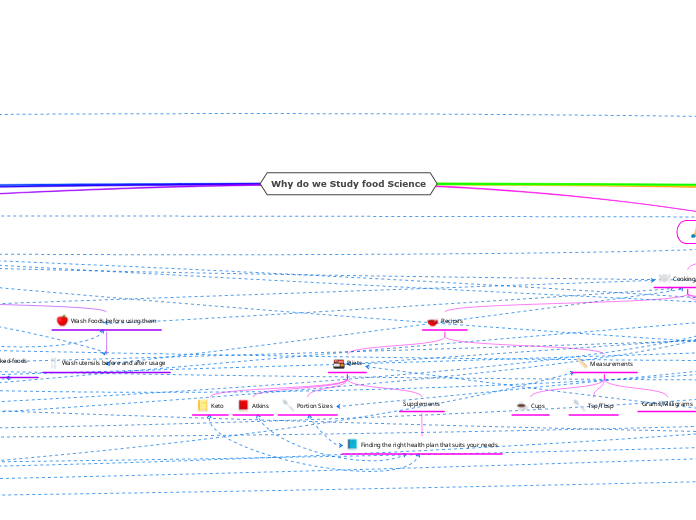Why do we Study food Science
Change our Habits and Behaviors to improve our lifestyles
Gain Knowledge of Food and how it effects the Human Body in order to Understand Healthy Living
Nutrition Facts
Check whats in your food
Canada's Food Guide
Serving Sizes
Fruit and Vegetables
Grain Products
Meat and Alternatives
Dairy
Food Industry Myths
Be mindful of what you listen to, not all information are facts
Can lead to Unhealthy living or may not be compatible with your body
What food is made of
There are solid and liquid foods
Carbohydrates
Fiber
Proteins
Lipids
Exercise
Physical Activities
Sports
Gatorade and Powerade
Electrolytes
Performance Enhancing Drugs
Athletes
Weight Training
Gain muscles
Can be done at the Gym or at Home
Walking
Running
Cardio
Good for your heart as it promotes good health
A persons weight
"Healthy weight"
Underweight
Overweight
Food is a Human Necessity
Maslow's Hierchy of Needs
Safety Needs
Physiological Needs
Cooking/Baking
A healthier way of preparing food to eat
Restaurants
Not a requirement for most people
Something people like and want
Menu
Not the healthiest food preparation option available
Chemistry
Recipes
Measurements
Grams/Milligrams
Tsp/Tbsp
Cups
Diets
Supplements
Finding the right health plan that suits your needs
Portion Sizes
Atkins
Keto
Food Safety
How to handle food correctlty
Wash Foods before using them
Wash utensils before and after usage
Precaution Methods
Keep similar foods together, don't mix raw and cooked foods like meat and vegetables together
Warm foods to their correct temperatures so that they are safe to eat
Food Preservation
Check expiry dates
Keep things cool in the fridge/freezer
Hand washing
Keep things clean
Avoid getting sick
Poor Food Handling
Cross-contamination
Food Poisoning
Bacteria/Germs
Knife Handling
Properly Cut, diced or minced foods
Injuries/Cuts
Unhealthy Lifestyle
Junk food
Health Risks
Not taking prescribed medication
Failure to treat health concerns
Severe risks
Death
Mild risks
Sickness
Risks of consuming foods
Food Born-Illnesses
Obesity
Diabetes
Eating Disorders
Healthy Lifestyle
Medication
Pills/Prescription given by the Doctor to aid a health concern
Balanced Diet
Gives you Energy for the day
Eating all that's necessary for survival
Being Fully Healthy in regards to food and Nutrition
Continue to improve and maintain health
Water
Food
Calories
Unprocessed
Foods in their most natural state or unaltered foods
Processed
Foods that are transformed using added foods in order to promote shelf life and preserve texture.
Minerals
Iron
Helps maintain Healthy Blood
Calcium
Healthy Bones and Teeth
Vitamins
A,B,C,D,E, B12, B6, B9, K
Nutrients
Compound containing whats necessary for life
Optimized Life
Live a long life
Less/No Health Issues
Will have better Health









